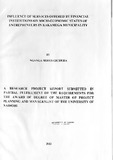| dc.description.abstract | This research was designed to establish the influence of flnaneial institutions on socioeconomic status of entrepreneurs in Kakamega Municipality. There were various related studies done in the world, in Africa and in Kenya which contributed to this research project. The background of the study showed that money is very important for any economy to thrive. Attiych and Lumsden observed that without money, our complex exchange economy would grind to a halt. Access of financial services contributes to rural development and poverty reduction by promoting income-enhancing and vulnerability-reducing investments. However, financial access was limited in most rural areas in developing countries becau~e of high transaction costs and risks attributed to low levels of economic activity, poor infrastructure, and poor public policies such as interest rate caps and debt write-offs as highlighted by Nair and Todd. The research objectives outlined in this study were to establish the influence of savings, lending, debt recovery and mobile banking on socio-economic status of entrepreneurs in Kakamega Municipality. Poverty level in Kakamega District stood at 57.7% in 1997 as indicated by Welfare monitoring Survey.
This compared unfavorably with the then Provincial figure of 51 % and national figure of 47%. This study was expected to help financial Institutions improve their products and services, serve as reference by future researchers who may have interest in the same area of study, serve the Government and nongovernmental organizations. The literature review discussed products and services offered by financial institutions globally and in Kenya and how they influence on socio-economic status of entrepreneurs. It also captures Government policies as a moderating factor and culture, personal factors as well as weather as intervening variables. On research methodology, the researcher used a descriptive survey research design while administering questionnaires and interview guides on a reasonable sample of the population. Findings of the study revealed that 98% of respondents operated accounts and were able to build savings and acquire assets, 56% had accessed loans which enabled them to improve their income and better their occupation, 25% had failed to pay loan installments on time and this had some negative impact on their socio-economic status. 47% and 45% respondents had accessed mobile banking and agency banking services respectively, both influencing their socio-economic status positively.
The study recommended that financial institutions need to make operation of savings accounts easy and lending affordable. It's important for customers to be more enlightened about mobile banking and prompt loan repayments. The study suggested further research on the following related topics; Influence of women enterprise fund on socioeconomic status of women entrepreneurs; Youth Enterprise fund and its influence on socioeconomic status of young entrepreneurs and population growth and its influence on socioeconomic status of entrepreneurs. These topics are related to this project and are likely to shed more light on why poverty level in Kakamega municipality is comparatively high. | en_US |

